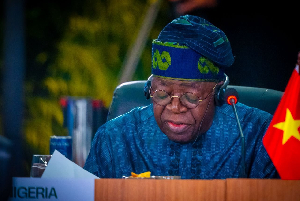Politics of Sunday, 16 November 2025
Source: www.punchng.com
PDP convention: No petition against judges on rulings, says NJC
The National Judicial Council has said it has not received any petition regarding the conflicting court orders issued by the Federal High Court in Abuja and the Oyo State High Court on the national convention of the Peoples Democratic Party held on Saturday.
This is as the NJC said litigants were responsible for the conflicting orders, not the judges.
On October 31, Justice James Omotosho of the Federal High Court, Abuja, while delivering judgment in a suit filed by three aggrieved PDP members — Austin Nwachukwu (Imo PDP Chairman), Amah Abraham Nnanna (Abia PDP Chairman), and Turnah Alabh George (PDP Secretary, South-South) — barred the party from holding its planned 2025 national convention in Ibadan and restrained the Independent National Electoral Commission from participating in it.
However, in a conflicting decision, the Oyo State High Court, sitting in Ibadan, permitted the PDP to proceed with the convention.
Justice Ladiran Akintola, ruling on an ex parte application filed by Mr Folahan Adelabi, an Oyo PDP member, directed INEC to attend and monitor the election of new national officers.
But in a separate suit instituted by former Jigawa State governor, Sule Lamido, Justice Peter Lifu of another Federal High Court in Abuja, on November 14, ordered the PDP to suspend the convention until Lamido was included as a contestant.
In protest against Justice Akintola’s judgment, three members of the PDP claimed that they had dragged the judge to the NJC for the conflicting order.
However, NJC’s Deputy Director of Information, Kemi Ogedengbe, in an interview with Sunday PUNCH, said the council would not query the judges involved in the matter, noting that the conflicting outcomes were a result of the actions of litigants, not judicial misconduct.
She explained that there were laid down procedures for addressing such conflicts, stressing that dissatisfied parties should appeal unfavourable judgments rather than instituting fresh suits before courts of coordinate jurisdiction.
Ogedengbe said, “When a high court delivers a judgment and a party is dissatisfied, the right thing is to approach the Court of Appeal, not another trial court. The litigants know the proper steps but chose otherwise. How can the NJC query judges when litigants themselves refuse to exercise their rights?”
She emphasised that both parties in the conflicting rulings include winners and losers, adding that it is “common sense” that aggrieved parties should seek redress at the appellate court.
Ogedengbe insisted that NJC couldn’t intervene unless due process is followed, reiterating that no petition has been submitted before the council in relation to the matter.












